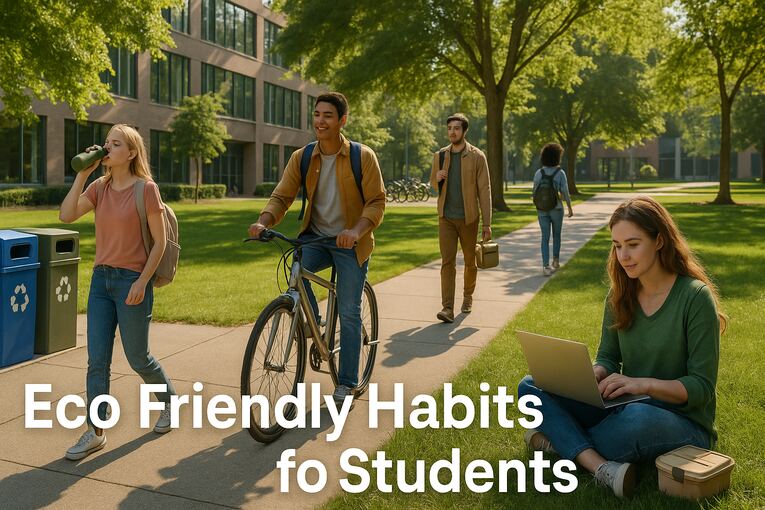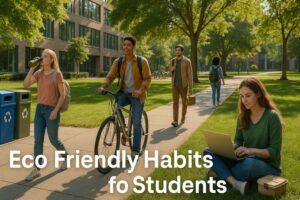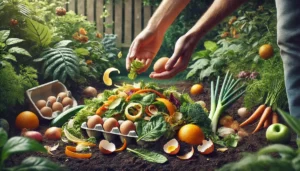Eco-friendly habits for students that are simple, practical, and fit into your daily routine with no extra effort.
Assignments, classes, projects, and endless deadlines. Amidst all this, it’s easy for our daily choices to unintentionally impact the environment. Most students do not want to be wasteful, but in the rush of student life, sustainability often gets overlooked.
The materials used in class, the way you travel to campus, and every action carry some environmental footprint. The good news is that becoming more eco-conscious doesn’t demand drastic lifestyle overhauls.
A few simple, thoughtful adjustments in how you study, eat, and live as a student can help reduce waste, save resources, and support a healthier planet.
This article presents 100 simple and practical eco-friendly habits for students. These ideas are organized into different aspects of student life, from the classroom to the cafeteria, allowing you to focus on habits that fit your routine.
Eco-Friendly Habits Made for Student Life
1. Eco-Friendly Habits at School or College
- Bring a reusable water bottle instead of buying bottled water on campus.
- Use refillable pens instead of use-and-throw pens.
- Take digital notes instead of using paper notebooks.
- Print only when necessary and use both sides of the paper.
- Ask your teachers to stop printing unnecessary handouts.
- Make sure you throw your trash in the designated bins.
- Avoid using plastic wrap or foil to carry lunch. Use a reusable lunchbox.
- Turn off lights and projectors in the classroom when not in use.
- Reuse old notebooks for rough work.
- Instead of buying new textbooks, borrow or buy second-hand.
- Use a cycle or walk to campus instead of using vehicles.
- Choose eco-friendly gifts to surprise your friends.
- Avoid single-use plastic bottles at events and fests.
2. Study and Learning Habits

Sustainable ways to learn, study, and manage academic materials.
- Use apps like Notion or Google Keep for to-do lists instead of paper planners.
- Record audio notes instead of writing long summaries.
- Annotate PDFs instead of printing study materials.
- Save resources online instead of printing them out.
- Share textbooks or reference materials with your classmates.
- Choose highlighters, pens, and other stationery products made from recycled materials.
- Create flashcards from old index cards or scrap paper.
- Store study materials in cloud drives to avoid paper backups.
- Avoid purchasing new stationery before finishing the old ones.
- Use pencil cases or organizers made from sustainable fabrics.
- Use reusable sticky notes.
- Rebind torn textbooks instead of buying new ones.
- Donate your old textbooks to juniors after exams.
- Use online journal resources during research.
- Archive old digital notes instead of maintaining hard copies.
- Avoid buying syllabus printouts—download them instead.
3. Student Lifestyle on and off Campus
Habits around living, commuting, and social life as a student.
- Use public transport or share rides with friends.
- Choose hostels or PGs near campus to reduce daily travel.
- Participate in college clean-up drives or tree-planting days.
- Skip freebies at college events if you don’t need them.
- Rent clothes for college functions instead of buying new clothes.
- Organize “no plastic” days in your hostel/dorm community.
- During college fests, use upcycled materials to decorate the campus.
- Dry your clothes in sunlight instead of electric dryers.
- Repurpose assignment folders for new projects.
- Share electronic chargers and power strips with roommates.
- Reduce fan/AC usage during cool weather by opening windows.
- Don’t upgrade gadgets for trends; use them longer instead of buying the latest ones.
4. Eco-Friendly Food and Cafeteria Habits

Student-focused eating habits on campus or in shared living spaces.
- Bring your tiffin box to the campus canteen.
- Avoid plastic-wrapped snacks from vending machines.
- Eat with reusable cutlery instead of using disposable ones.
- Order food with friends to reduce packaging waste.
- Do not waste food. Take only what you can eat.
- Use a cloth napkin instead of paper towels during meals.
- Drink from water coolers instead of buying bottled drinks.
- Buy fruits and snacks from local vendors instead of packaged ones.
- Skip trendy fast-food items that come with excess plastic.
5. Campus Community and Eco-Leadership
Habits that involve leading or participating in group eco-actions as a student.
- Propose a plastic-free event policy for your college festival.
- Replace plastic decorations with eco-friendly alternatives at events.
- Encourage student committees to avoid balloons or plastic décor.
- Help your hostel set up a proper waste management system.
- Start a sustainability blog or newsletter in your college.
- Run donation drives for old clothes and books at the end of the semester.
- Represent your college in environmental competitions or green expos.
- Help install bird feeders or rainwater harvesters in campus areas.
Conclusion: Eco-Friendly Habits for Students
Being eco-friendly as a student doesn’t mean doing everything perfectly. It just means paying attention to your everyday choices. Whether in class, at the canteen, or studying in your room. These habits are simple ideas to help you get started. Even if you try just a few, you’re already helping the planet. As your routine changes, you can add more habits that work for you. Living sustainably doesn’t mean doing everything at once. Instead, take one step at a time and watch how your choices matter.




